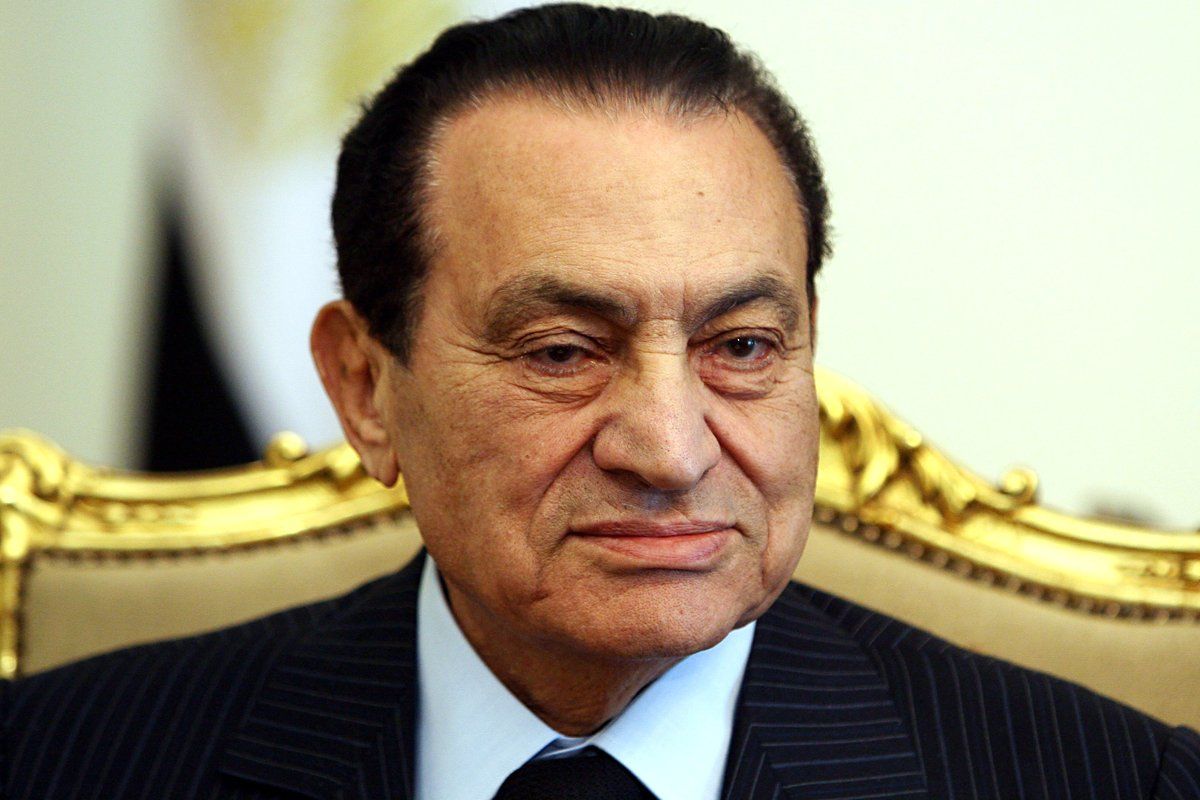
A ritual of sorts tends to mark the fall of a dictator. His torture chambers are opened, and the electrical cables and bloodstains testify to his crimes. Under the worst tyrants, like Iraq's Saddam Hussein, there are photographs, too. His torturers were meticulous record keepers, taking pictures up to and including the subject's gruesome death. As light shines into those fetid cells, emotional cleansing begins. Responsibilities are understood and must be assumed.
The torture chambers have not been opened yet in Tunisia or Egypt. The dictators are gone, but not their Praetorian guards, who are now in charge. The military, the secret police, the legions of spies and informers, interrogators and torturers remain. Faced with mass uprisings that all their ferocious coercion had failed to predict, the Praetorians opted to oust the leaders they'd served and to save themselves. Their promises of freedom, thus far, are no more than hypothetical.
As the Obama administration nevertheless rushes to embrace the Middle East's rising democrats, there's one daunting obstacle: America's long record of secret and not-so-secret connivance with dictators across the region. After all, Hosni Mubarak's riot cops left Tahrir Square littered with spent tear-gas canisters labeled made in u.s.a. The United States is hardly the only culprit: Britain, France, Italy, Russia, and China have all put their weight behind Arab dictatorships. But as pro-democracy uprisings sweep one Arab capital after another—and Tehran as well—it's vital to understand "the mechanics of violence," as Iraqi intellectual Kanan Makiya calls it in his book The Republic of Fear. That's what has kept the region's kings, emirs, presidents for life, and mullahs in power for so long, and it's what may preserve many of them still, at least for a while.
Just about every Arab country is ruled by a family whose paramount goal is to stay in power. With the curious and very particular exception of ultrasectarian Lebanon, there's no history of leaders stepping down voluntarily, nor has there ever been. In the 1950s and '60s, a coup d'état was the most common way to change a government: 55 were attempted between March 1949 and December 1980, and roughly half succeeded. The new tyrants took lessons from their own successful conspiracies, keeping their subjects isolated not only from the outside world, but also from each other. Saddam went so far as to ban privately owned typewriters and copiers (even ancient mimeograph machines), lest they help his enemies circulate tracts against him. Never mind Facebook and Twitter—under his regime, Xeroxing was subversive.
But the real key to regime survival has been what RAND Corporation analyst James Quinlivan calls "coup-proofing." In an influential 1999 study, Quinlivan itemized the basic safeguards for dictatorships. First: consolidate an inner core bound to the regime by "family, ethnic, and religious loyalties"—in essence, a mafia, with goodfellas in various guises protecting the big guy's back (and their own; if he goes down, so do they). Second: create a parallel military devoted to regime protection, like Iran's Revolutionary Guard Corps, which does the Supreme Leader's bidding while the remnants of the shah's Army stand by. Third: maintain multiple secret police, security, and espionage services that spend much of their time keeping each other in check.
And the regular army still has to be bought off. One technique is to keep military officers busy and professionally satisfied through "the fostering of expertness," as Quinlivan calls it: "Send them off to foreign military academies." But that carries its own risks—you never know what foreign ideas they might pick up when the secret police aren't listening. (This is why Egypt's officer corps is under strict orders not to fraternize during its frequent joint exercises with the United States.) So it's also a good idea to make the army a partner in dictatorship by giving officers plenty of special opportunities to make money. In Egypt, the military has profited from real-estate deals, and what a 2008 U.S. Embassy cable released by WikiLeaks describes as "military-owned companies, often run by retired generals, [that] are particularly active in the water, olive oil, cement, construction, hotel and gasoline industries." Still, even ostensibly loyal officers can get greedy and jealous. The same cable notes the rivalry between Egyptian commanders and civilian businessmen close to President Mubarak's son Gamal. When the military took power from Mubarak earlier this month, the first cabinet members to be ousted and face prosecution were the businessmen.
Coup-proofing isn't cheap. The region's big oil producers can usually afford it, especially when crude prices are as high as they are now. Regimes without substantial oil reserves tend to rely on foreign patrons. As Britain reduced its presence in the Middle East in the 1970s and '80s, America filled the gap. The founder of Saudi Arabia, Abdel Aziz ibn Saud, kept British agent St. John Philby (father of the notorious Cold War mole Kim Philby) as a personal adviser in the 1920s and '30s. But after World War II, the Saudis decided Americans were more trustworthy, and worked closely with a succession of CIA station chiefs in Riyadh, including John Brennan, who is now the top counterterrorism official in the Obama White House.
For pro-democracy activists in the region, the CIA's involvement is a dangerously charged issue, but its traces are everywhere. From the Clinton administration onward, Washington collaborated with Egypt, Jordan, and other friendly Arab governments to seize suspected terrorists in third countries (Albania, Italy, and elsewhere), returning them to their homelands to face interrogation, torture, and, in some cases, execution. This "rendition" program suited the regimes' needs by helping them eliminate terrorist enemies, and it also became, for a while, a vital component in what the George W. Bush administration called the Global War on Terror. But that's only one facet of America's covert activities in the region. One of the least-publicized duties of American (and other) intelligence operatives in the Middle East is simply to talk to its important players in ways that diplomats do not (and in many cases cannot). For years while Washington had no official contact with Yasir Arafat and his Palestine Liberation Organization, the CIA stayed in close touch with PLO leaders, including the mastermind of the infamous Black September organization, Ali Hassan Salameh.
America's undercover contacts have spanned the spectrum of Arab politics and society. Besides keeping channels open to Arafat's camp, CIA officers also forged a close relationship with Jordan's King Hussein, paying him a stipend and helping him build his country's General Intelligence Department (GID), which, according to several Washington sources, receives U.S. funding to this day. In the 1970s and '80s, GID headquarters was known as "the fingernail factory," an allusion to some of the "enhanced" interrogation techniques used there. In the 1990s, the king worked closely with the CIA on its unsuccessful efforts to mount a coup against Saddam, and he even helped gather intelligence in Bosnia. "He was really a global thinker," remembers a senior CIA official who dealt with him at the time. The GID played a vital role in King Abdullah's accession to the throne after his father's death in 1999, but Abdullah has since fired a succession of GID chiefs. That's not likely to inspire loyalty in the organization traditionally most critical to his survival—which may be one reason concern is rising about Jordan's stability. Nevertheless, Abdullah is still said by Jordanian intelligence sources to be listening closely to current and former CIA personnel.
Egypt's Mubarak had his own way of ensuring longevity: he made sure none of his senior officers was popular enough or, it was said, smart enough to stage a coup. His one obvious rival at the top of the military, Field Marshal Mohamed Abd al-Halim Abu Ghazala, served as defense minister in the 1980s and helped saved the regime by rolling tanks into the streets after security-force recruits rioted in 1986. But precisely because of Abu Ghazala's power and prestige, Mubarak forced him out in 1989. Field Marshal Mohamed Hussein Tantawi, defense minister since 1991, was apparently so loyal and so obsequious that in one U.S. Embassy cable distributed by WikiLeaks he's described as "Mubarak's poodle." But when the time arrived to choose between his own future or Mubarak's, Tantawi pushed Mubarak out. Now, as head of the junta ruling Egypt, Tantawi appears to be the man who will decide whether the Army will help Egypt move toward greater freedoms, or simply defend the interests of the military-industrial complex.
The missing element in the long history of American collusion with Arab dictators is any semblance of democratic process. After years of communicating with tyrants and currying favor by trying to keep their regimes in power—often in secret—America and its erstwhile allies are now confronted, together with its dictator allies and their Praetorians, with swarms of young Arabs who are as mad as hell and are not going to take this anymore. Washington, ever cynical, may be tempted to side with the protesters in public and the Praetorians in private, as it has often done in the past. But eventually the torture chambers will have to be opened; responsibility must be understood and assumed.
Uncommon Knowledge
Newsweek is committed to challenging conventional wisdom and finding connections in the search for common ground.
Newsweek is committed to challenging conventional wisdom and finding connections in the search for common ground.
About the writer
To read how Newsweek uses AI as a newsroom tool, Click here.





